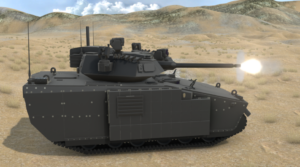BAE Systems will not protest the Army’s award decision for the XM30 Mechanized Infantry Combat Vehicle program, after the service didn’t select the company to move forward in the Bradley replacement effort.
A company spokesperson confirmed the decision to
Defense Daily on Wednesday, which followed a debriefing from the Army on the program formerly known as Optionally Manned Fighting Vehicle (OMFV).

“After careful evaluation and debrief conversations with the U.S. Army, we have decided not to pursue a protest following the Optionally Manned Fighting Vehicle (OMFV) Phase III and IV award. While we are disappointed with the result, we remain focused on producing quality vehicles and expanded capabilities for soldiers. We look forward to continuing to be a reliable partner for the U.S. Army and finding new ways to innovate alongside them in the future,” a BAE Systems spokesperson said in a statement.
The Army announced in late June it had selected General Dynamics Land Systems [GD] and American Rheinmetall Vehicles to move onto the detailed design and prototype build phases for XM30, and awarded the two firms $1.6 billion in contracts (Defense Daily, June 26).
GD Land Systems and American Rheinmetall Vehicles beat out bids from BAE Systems, Oshkosh Defense [OSK] and armor supplier Point Blank Enterprises.
Oshkosh Defense said in a statement to Defense Daily it won’t comment on “potential legal actions,” while Point Blank Enterprises has also not confirmed whether it will protest the XM30 decision.
“We won’t comment on any potential legal actions. Oshkosh is extremely proud of our team’s work on the OMFV program, the world-class team that we assembled, and the capabilities we’ve demonstrated in the combat vehicle market. As we move forward, we remain committed to supporting the U.S. armed forces in the design and delivery of the world’s most capable military vehicles and technology solutions that enable our warfighters to perform their missions and return home safely,” Oshkosh Defense said in a statement.
All five firms had previously been awarded $300 million in contracts in June 2021 to work on the concept refinement phase for the Bradley replacement competition (Defense Daily, July 23 2021).
Last November, BAE Systems offered its most extensive insight to date on its bid for XM30, then known as OMFV, detailing its 50-ton, hybrid-electric offering that featured a new Elbit Systems of America-supplied turret (Defense Daily, Nov. 30 2022).
BAE Systems, which builds the Army’s Bradleys, also said at the time its offering also included the Iron Fist active protection system and a multi-mission missile launcher, and noted its bid met the Army’s call for a two-man crew with a digital architecture bringing in artificial intelligence systems and aided target recognition capabilities.
The Army will hold a limited competition between GD Land Systems and American Rheinmetall Vehicles for the eventual XM30 production contract, with plans to select a winner in 2027.
Doug Bush, the Army’s top acquisition official, previously discussed the decision to only select two vendors for the next phases of the XM30 program, after the service had previously noted it could award up to three deals.
“Focusing our resources on two ensures those will be properly funded. So it was a resource-informed decision but one that also lets us retain competition. So it kind of became a sweet spot between the two demands we had there,” Bush said during a press briefing ahead of the June contract announcement.